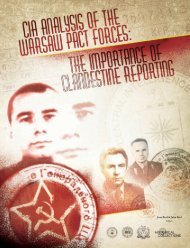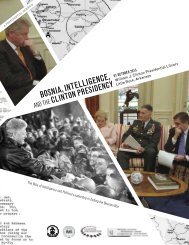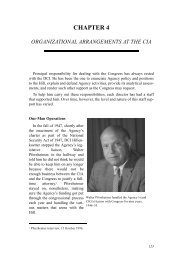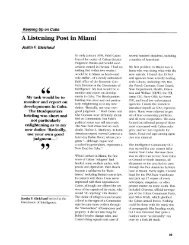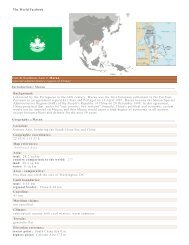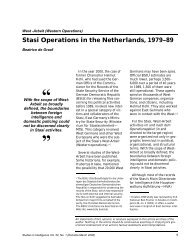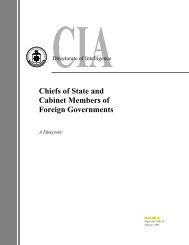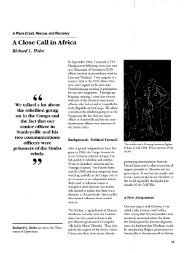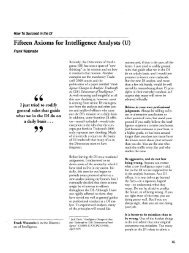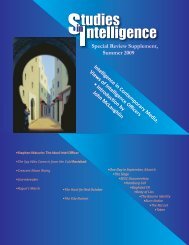Analytic Culture in the U.S. Intelligence Community (PDF) - CIA
Analytic Culture in the U.S. Intelligence Community (PDF) - CIA
Analytic Culture in the U.S. Intelligence Community (PDF) - CIA
Create successful ePaper yourself
Turn your PDF publications into a flip-book with our unique Google optimized e-Paper software.
BIBLIOGRAPHY<br />
Thompson, J. R., R. Hopf-Weichel, and R. Geiselman. The Cognitive Bases of<br />
<strong>Intelligence</strong> Analysis. Alexandria, VA: Army Research Institute, Research<br />
Report 1362, 1984, AD-A146.<br />
Tierney, William G., and Robert A. Rhoads. Faculty Socialization as Cultural<br />
Process: A Mirror of Institutional Commitment. Wash<strong>in</strong>gton, DC: ASHE-<br />
ERIC Higher Education Report No. 6, 1993.<br />
Tobias, Sigmund. “When Do Instructional Methods Make a Difference?” Educational<br />
Researcher 11, no. 4 (1982): 4–9.<br />
———, and L. T. Frase. “Educational Psychology and Tra<strong>in</strong><strong>in</strong>g” <strong>in</strong> S. Tobias<br />
and J. D. Fletcher, eds. Tra<strong>in</strong><strong>in</strong>g and Retra<strong>in</strong><strong>in</strong>g: A Handbook for Bus<strong>in</strong>ess,<br />
Industry, Government, and <strong>the</strong> Military. New York: Macmillan Library Reference,<br />
2001.<br />
Treverton, Gregory F. Reshap<strong>in</strong>g National <strong>Intelligence</strong> <strong>in</strong> an Age of Information.<br />
Cambridge: Cambridge University Press, 2001.<br />
Trier, Jost. Der deutsche Wortschatz im S<strong>in</strong>nbezirk des Verstandes. Heidelberg:<br />
Carl W<strong>in</strong>ter, 1931.<br />
Trochim, William. The Research Methods Knowledge Base. C<strong>in</strong>c<strong>in</strong>nati, OH:<br />
Atomic Dog, 2001.<br />
Tulv<strong>in</strong>g, E., and D.M. Thomson. “Encod<strong>in</strong>g Specificity and Retrieval Processes<br />
<strong>in</strong> Episodic Memory,” Psychological Review 80 (1973).<br />
Tversky, Amos, and Daniel Kahneman. “The Belief <strong>in</strong> <strong>the</strong> ‘Law of Small<br />
Numbers,’” Psychological Bullet<strong>in</strong> 76 (1971): 105–10.<br />
———. “Judgment Under Uncerta<strong>in</strong>ty: Heuristics and Biases,” Science 185<br />
(1974): 1124–31.<br />
US Jo<strong>in</strong>t Forces Command. Department of Defense Dictionary of Military<br />
and Associated Terms. USJFCOM Jo<strong>in</strong>t Publication 1-02. Amended through<br />
June 5, 2003. (http://www.dtic.mil/doctr<strong>in</strong>e/jel/doddict/<strong>in</strong>dex.html.)<br />
von Humboldt, Wilhelm. “Uber die Verschiedenheit des Menschlichen<br />
Sprachbaues” <strong>in</strong> B. Bohr, ed. Gesammelte Schriften. Berl<strong>in</strong>: Verlag, 1907.<br />
Voss, James, and Timothy Post. “On <strong>the</strong> Solv<strong>in</strong>g of Ill-Structured Problems”<br />
<strong>in</strong> Michelene Chi, Robert Glaser and Marshall Farr, eds. The Nature of<br />
Expertise. Hillsdale, NJ: Lawrence Erlbaum Associates, 1988.<br />
Vygotsky, Lev. M<strong>in</strong>d and Society, Cambridge: Harvard University Press,<br />
1930.<br />
Wanous, John P. Organizational Entry: Recruitment, Selection, Orientation,<br />
and Socialization. Read<strong>in</strong>g, MA: Addison-Wesley, 1992.<br />
———, et al. “The Effects of Met Expectations on Newcomer Attitudes and<br />
Behavior: A Review and Meta-Analysis,” Journal of Applied Psychology 77<br />
(1992): 288–97.<br />
Warner, Michael. “Wanted: A Def<strong>in</strong>ition of ‘<strong>Intelligence</strong>,’” Studies <strong>in</strong> <strong>Intelligence</strong><br />
46, no. 3 (2002):15–22.<br />
155



